Iran Calls On Taliban To Respect Women’s Rights
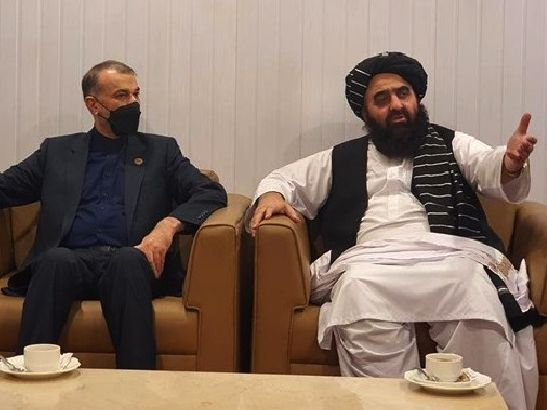
While many express shock by how Iran on Tuesday pepper sprayed women who wanted to watch a football match, its foreign minister has urged the Taliban to respect women’s rights.

While many express shock by how Iran on Tuesday pepper sprayed women who wanted to watch a football match, its foreign minister has urged the Taliban to respect women’s rights.
Hossein Amir-Abdollahian made his remark during a meeting with his Taliban counterpart Amir Khan Muttaqi in China, on Thursday, where foreign ministers of Afghanistan’s neighboring countries had gathered.
Amir-Abdollahian called for women’s right to education at all levels and their participation in different sectors of the society.
“The role of women in Afghanistan is very important to us... Islam recognizes the presence of women in various fields as their inalienable right,” he said.
In reaction to Amir-Abdollahian’s remarks, senior Israeli diplomat Joshua L. Zarka posted a tweet in Persian, calling it “utmost hypocrisy”. “What do Iranian and Afghan women think about the role you ‘give’ them?”
On Tuesday security forces denied women entry into a stadium in Mashhad to watch a FIFA World Cup qualifier between Iran and Lebanon and used tear gas and pepper spray to disperse them.
Mashhad is home to numerous hardliner clerics who are against women’s presence in male dominated venues. Firebrand representative of the Supreme Leader in the city, Ayatollah Ahmad Alamolhoda has been banning concerts and cultural events for years.
Other than the Taliban regime in Afghanistan, Iran is the only FIFA member country to bar women from football stadiums to watch men’s matches.
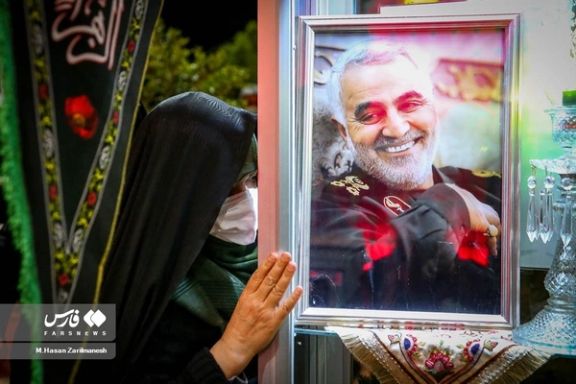
Washington wants Iran to stop threats against US officials for the killing of Ghasem Soleimani if it wants its Revolutionary Guard to be removed from a terrorist list.
The United States will not remove the Revolutionary Guard (IRGC) from its list of Foreign Terrorist Organizations (FTO) unless Tehran pledges to cease its death threats against US officials for the killing of the IRGC's Ghasem Soleimani, a source close to the Vienna talks has told Radio Farda, the Persian service of the US government funded Radio Free Europe.
Iran's Supreme Leader Ali Khamenei, President Ebrahim Raisi, and IRGC officials have repeatedly vowed to avenge Soleimani's death.
“Trump and others like him will be forgotten and lost in the dustbin of history, of course after paying for their crimes in the world," Khamenei said on January 1, two days before the anniversary of Soleimani's killing in Baghdad in January 2020 on former US President Donald Trump's orders.
In a televised speech two days later, Raisi said that "Muslims" would take revenge" if Trump and former Secretary of State Mike Pompeo were not "tried in a fair court for the criminal act of assassinating Soleimani."
The source who spoke on condition of anonymity told Radio Farda that Tehran's last-minute demand for delisting the IRGC is currently the biggest hurdle in the way of an agreement to restore the 2015 Iran nuclear deal, Joint Comprehensive Plan of Action (JCPOA).
Soleimani, who was Iran’s top military and intelligence operator outside its borders, was in charge of supporting and organizing militant proxy forces, including the Lebanese Hezbollah and Iraq Shiite militia groups that have repeatedly attacked US forces.
The European Union's top diplomat Josep Borrel said Monday that talks were stuck by Tehran due to new demands that weren’t part of the JCPOA, such as the status of the IRGC, after a hurdle thrown by Russia was overcome. "It’d be a shame not to reach some sort of an agreement when we're so near to reaching one,” Borrel told the European Parliament
The source also told Radio Farda that the US has asked Iran to pledge that it will not threaten and harm US citizens and facilities in the region.
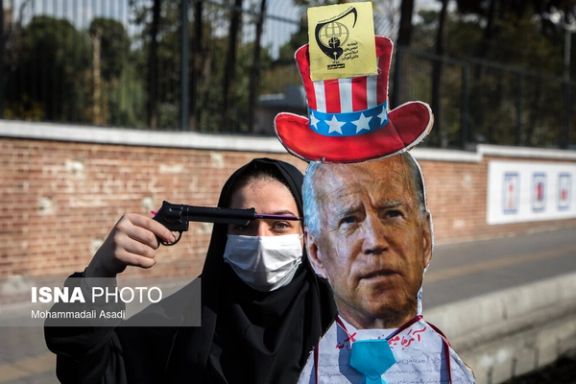
According to Radio Farda's source, Iranian Foreign Minister Hossein Amir-Abdollahian's remarks in an interview Saturday referred to the US condition of not pursuing revenge for Soleimani's killing. "When we say IRGC we mean General Ghasem Soleimani," Amir-Abdollahian said in the interview.
"Regarding the IRGC, what is important is to acknowledge the standing and the central role of the IRGC in our security and defense. [Negotiators] relayed some messages to the US [in this regard]," Amir-Abdollahian said in the same interview.
Trump administration officials have strongly opposed the possibility of the IRGC's delisting. In a joint statement last week, three former senior officials, including former Secretary of State Mike Pompeo, former national security adviser Robert O’Brien, and former director of national intelligence John Ratcliffe said delisting the IRGC would be “a dangerous capitulation" and "a denial of the basic reality that the IRGC's core mission is to spread terror."
“The pursuit of an ill-conceived ‘deal’ should not compel American leaders to acquiesce to the demands of a terrorist regime to deny the truth. American lives are at stake, and this is a time to project strength, not weakness," they said in their statement shared with Axios.
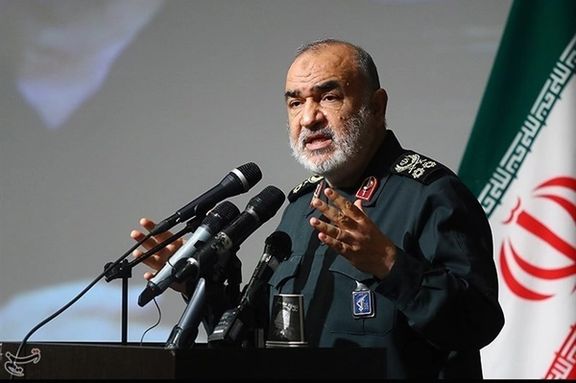
The commander of Iran’s Islamic Revolution Guards Corps (IRGC) has urged states around the Persian Gulf to end their dealings with Israel, alleging that the country’s activities in the region are a cause of insecurity.
“Unfortunately, some countries on the southern side of the Persian Gulf have established political and security relations with [Israel], which poses a serious threat to the security of the region and these states themselves”, Major General Hossein Salami said on Wednesday during a visit to the southern island of Abu Musa, near the strategic Strait of Hormuz.
“We explicitly declare and warn that the continuation of such relations is not acceptable at all,” Salami said, speaking alongside IRCG Navy commander Admiral Alireza Tangsiri.
Salami also praised the combat power of IRGC units, especially those deployed to Iran’s islands in the Persian Gulf, the Strait of Hormuz and the Sea of Oman, as well as the capabilities of the Revolution Guards’ naval forces in the fields of drones, missiles, electronic warfare and submarines, adding that these forces can show timely and effective response to any threats.
The IRCG commander’s comments follow recent media reports that an air defense pact between Israel and friendly regional countries is in the works to confront threats posed by Iranian drones and missiles.
The reports came in the wake of a two-day meeting on March 27-28, dubbed the “Negev Summit”, which brought together the top diplomats of Israel, the United States, and four Sunni Arab states, including the Persian Gulf countries of Bahrain and the United Arab Emirates.
Wrapping-up the landmark gathering in Israel, Israeli foreign minister Yair Lapid announced the participants had decided to make the summit into a “permanent forum” that he said would help confront “our common enemies, first and foremost Iran and its proxies”.

Iranian academic Mohammad Fazeli and reformist political commentator Abbas Abdi have explored the best and worst-case scenarios for Iran as it entered a new year on March 21.
Fazeli, a sociologist who was fired from the Sharif University of Technology in Tehran in January for undermining the party line in his lectures, said "the government's competency, its social capital, and the international situation are three variables that determine the country's economic prospects."
He offered an optimistic and a pessimistic scenario. He ruled out that the government’s poor performance can improve, because a change in the combination of players is out of the question.
President Ebrahim Raisi came to office with the motto of hardliners uniting to run the government and his choice of officials is limited to leftovers of former controversial president Mahmoud Ahmadinejad’s aides.
In the light of public dissatisfaction with the Raisi administration, Fazeli argued that any improvement in the government’s standing should come with a change in its foreign policy to open doors for economic improvement. But so far there is no sign of a shift.
Although the paradoxical formula leaves little room for optimism, Fazeli said that there might be a tentative breakthrough if Iran reaches a nuclear agreement with the West, which would lend a new lease of life to the economy and help the government, similar to what happened after the nuclear deal in 2015.
Fazeli insisted that the benefits of an agreement would not last long as Donald Trump or someone like him could always win the presidency in the United States. During the short breakthrough, however, the government can put up a show of its competence by controlling inflation and prices, and boost the battered Iranian currency.
Nonetheless, Fazeli said that Iran is a country at the brink. The government needs political courage and honesty to confront interest groups who are used to getting unfair economic advantages.
Fazeli went on to say that the worst-case scenario will occur when government officials adopt policies or make statements that would erode its legitimacy further. The situation will become even worse if negotiations with the West are not fruitful and radicals take the upper hand in the government. This, he said, will lead to protests with unpredictable consequences.
Iran needs ‘a détente’
Meanwhile, Abdi, who regularly writes for Iran's reformist newspapers, said that Iran needs a process of detente in its international relations to reach a long-term solution for its nuclear crisis. However, he expressed doubt that such a change would occur in the new year.
Abdi added that Iran's economic problems need political rather than economic solutions. "We are talking about those political variables that will totally change the government's approach." He added that the key elements affecting Iran's situation include, foreign policy, domestic politics and managerial approaches which are interlinked.
A good solution to the nuclear question can give the economy a boost although its effect may not be as big as it was in 2015. However, a deal on the nuclear issue will not encourage foreign investment because the companies know that the situation may change in two years. Without a fundamental solution to the nuclear program, the economic crises will worsen, Abdi said.
On the domestic front, the hardliners' rise to power is irreversible. But the problem is that coalitions among hardliners are loose and unstable, so there is a chance that political instability and social tensions will rise. The year that just started will be a continued purgatory, he argued.
The managerial approach, which is based on reliance on managers less educated than average Iranians, cannot create any sustainable growth or boost employment. All they can do is wasting resources. This is the Iranian economy's main problem Abdi said, adding that even if nuclear talks lead to an agreement, not much can be done in the absence of good plans, management, and coordination.
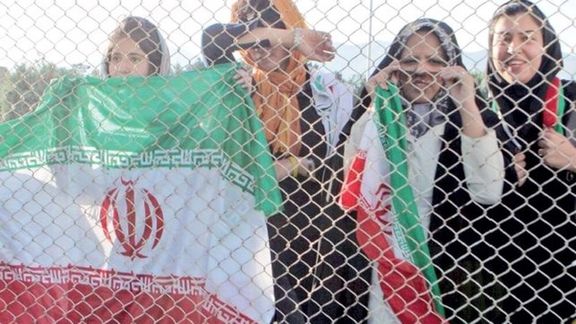
Iran's government and football federation officials are blaming each other for an incident in Mashhad during which women who wanted to watch a soccer game were pepper sprayed.
On Tuesday security forces denied women entry into a stadium to watch a FIFA World Cup qualifier between Iran and Lebanon and used tear gas and pepper spray to disperse them.
In a statement Wednesday, the football federation of the Islamic Republic blamed time constraints for failing to properly organize ticket sales and organizing women's presence at the Emam Reza Stadium in the religious city of Mashhad and argued that federation officials had not "invited" women to purchase tickets to watch the game.
Without offering any apologies, the federation also said that there had been no plans to allow spectators to watch the game at until 72 hours before the game and claimed that the tickets held by women had been sold by "ticket forgers" or the women who purchase tickets online had lied about their gender. "Only nine women had purchased tickets for men's section of the stadium who will be reimbursed with 48 hours," the statement said.
"Doubtlessly the bitter episodes during this game were the result of mischief and profiteering of individuals who jeopardized the order and security of the stadium by printing and selling fake tickets," the federation alleged.
Many Iranians on social media have slammed the federation for suggesting that women should have been "invited" to watch the game by the federation authorities, but men could do so without being granted a special permission. "This statement is clear evidence of gender discrimination," a tweet by an Iran journalist who also called for a FIFA ban on Iran's football federation said.
President Ebrahim Raisi on Wednesday ordered an investigation into the incident which occurred in his hometown of Mashhad. The incident may mar Raisi's scheduled provincial tour to Mashhad where he headed with some cabinet ministers on Wednesday.
Iran's state media which are controlled by hardliners completely ignored the news about the incident in Mashhad. The state broadcaster (IRIB) did not report the violence against women and even censored a remark by Alireza Jahanbakhsh, one of the players for Iran's national team, who after the game said in an interview that he hoped women could watch the team's games at stadiums in the future.
The official news agency IRNA also censored the violence against female soccer fans in its reports. IRNA said Wednesday that Raisi has ordered the interior minister to investigate the "ticket sales process, failure to abide by the Covid protocols … regarding the maximum number of those allowed to attend the game," as well as "the violation of the rights of some citizens who had purchased tickets".
FIFA has been insisting for years that the Islamic Republic should relax the ban on women's presence at soccer stadiums and allow female spectators to its stadiums.
"FIFA should be held accountable for participating in Iran's human rights violation because it has not enforced its clear regulations and disciplinary rules on Iran codes all these years," Mehdi Rostampour, journalist and former presenter of sports program for the state-run broadcaster (IRIB), told Iran International TV on Wednesday.
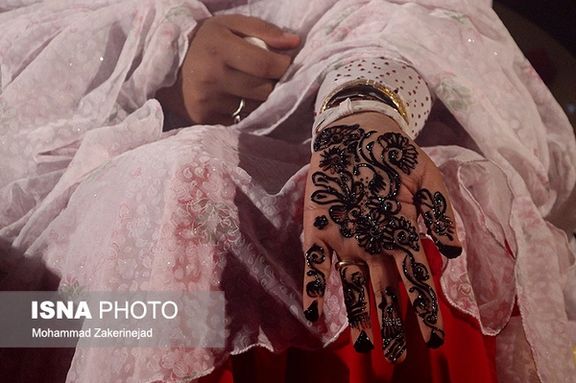
As many as 131,365 girls under the age of 15 have been married in Iran over the last five years, according to official data quoted by local media.
Tejarat News on Tuesday cited data from the Statistical Center of Iran (SCI) as showing that more than 7,500 of the marriages took place during the summer of 2021.
The numbers do not include unregistered marriages, which are common in the country’s rural areas.
Under the Islamic law, or Sharia, the minimum age at marriage for girls is 13 and 15 for boys.
Since the Iranian year of 1396, which started in March 2017, an average of about 30,000 girls under the age of 15 have been married every year.
During the same period, an average of 123 boys under that age have been married in the country.
ISNA earlier reported that 791 children were born to mothers aged between 10 and 14 in the first six months of the previous Iranian year beginning in March 2021. The semi-official news agency said that most of these births took place in the southeastern province of Sistan-Baluchestan.
Earlier in March, a married teenage girl who had experienced "domestic violence" set herself on fire in Sistan-Baluchestan, according local media reports.
It was the second reported case of self-immolation by a married Baluch girl in the past few months.